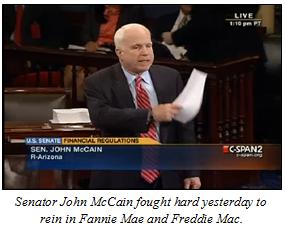
It is now up to Senate Republicans to mount a filibuster against this bill, which instead of real reform, would create an unlimited bailout and government takeover authority for the federal government to arbitrarily seize companies and redistribute their assets.
The first amendment, offered by Senator David Vitter, would have conducted a full audit of the Federal Reserve, which through lower-than-justified interest rates and monetary expansion, accommodated the unbridled inflation of the housing bubble throughout the 1990’s and 2000’s.
That amendment was unfortunately defeated 62 to 37. Yesterday, Americans for Limited Government President Bill Wilson denounced the vote, saying, “Without the Vitter amendment, the Federal Reserve will continue to operate in secret and with impunity, endangering the financial system, weakening the dollar, and subsidizing risky bets in the markets.”
Just this week, the Federal Reserve announced that it was extending a credit line to foreign central banks, including the European Central Bank, to expedite lending throughout the continent. This is the sort of transaction that would have been audited under the Vitter amendment. It comes as the European Central Bank announced that it is purchasing some €1.7 trillion of sovereign debt bonds from troubled European states, and as the European Union and International Monetary Fund (which U.S. taxpayers fund) announced a €750 billion bailout package for the entire continent, including a €110 billion bailout for Greece alone.
Both bankrupt states and their creditors are getting a bailout in this case, since the plan simultaneously disincentivizes austerity measures to be taken by government and incentivizes lending money to defaulting nations because of the higher interest rate of return. All in a good day’s work for the Federal Reserve and other central banks.
The second, an amendment offered by Senator John McCain, would have reined in and unwounded government ownership of mortgage giants Fannie Mae and Freddie Mac. Thus far, taxpayers have had to shell out $126.9 billion to the GSE’s since the 2008 bailout, with both companies in the past week requesting an additional $19 billion in bailouts. The McCain amendment would have required that the government conservatorship be ended within 30 months, and then either be liquidated, or rendered solvent and selling off much of their portfolios. After a period of 3 years, the GSE’s federal charters would have expired.
The McCain amendment would also have repealed so-called “affordable housing goals” imposed on the GSE’s by the federal government. According to former chief credit officer of Fannie Mae, Edward Pinto, from 1992 onward, the Department of Housing and Urban Development (HUD) loosened lending standards by imposing “affordable housing goals” on Fannie Mae and Freddie Mac, adopted “Fair Lending Best Practices” requiring low-income lending, and promulgated new Community Reinvestment Act “regulations applicable to all insured banks, in particular a change from a qualitative standard to a quantitative.”
Making matters worse, Fannie and Freddie took on some $1.835 trillion in higher-risk mortgages and mortgage-backed securities just before they were nationalized. This included high risk loans in whole loan form, most of which, $1.646 trillion, were GSE-issued mortgage-backed securities, and $189 billion of subprime and Alt-A private mortgage-backed securities. The GSE’s actually drove the riskier mortgage market, according to Pinto: the “market response was: if it’s okay with Fannie and Freddie (the de facto standards setters) it must be okay for us.”
Alas, the McCain amendment was defeated 56 to 43, leaving none of those root causes addressed. Instead, Fannie and Freddie are increasing their market share, which along with the Federal Housing Administration, accounted for 96.5 percent of all home loans in the first quarter. That’s up from 90 percent at this time last year.
There are more root, government causes of the financial crisis the Senate is failing to address with the Dodd bill. As noted above, the HUD Community Reinvestment Act regulations, “affordable housing goals” and “fair lending best practices” are not being repealed. In addition, weakened down payments mandated by the Federal Housing Administration are not addressed, either.
The risk now is that Senators will vote to pass the Dodd bill just to give the appearance of “doing something”, despite its obvious overreach in granting unlimited bailout and government takeover authority to regulators, and in spite of the legislation’s failure to address a single root, government cause of the crisis.
Congress can do better than this, and only Senate Republicans can stop this abomination before it becomes the law of the land. They should courageously filibuster the measure, and propose new legislation that strengthens credit standards, reduces the government ownership of housing, puts an end to the Federal Reserve’s easy money policies, and brings an end to the bailouts and government takeovers, once and for all.

